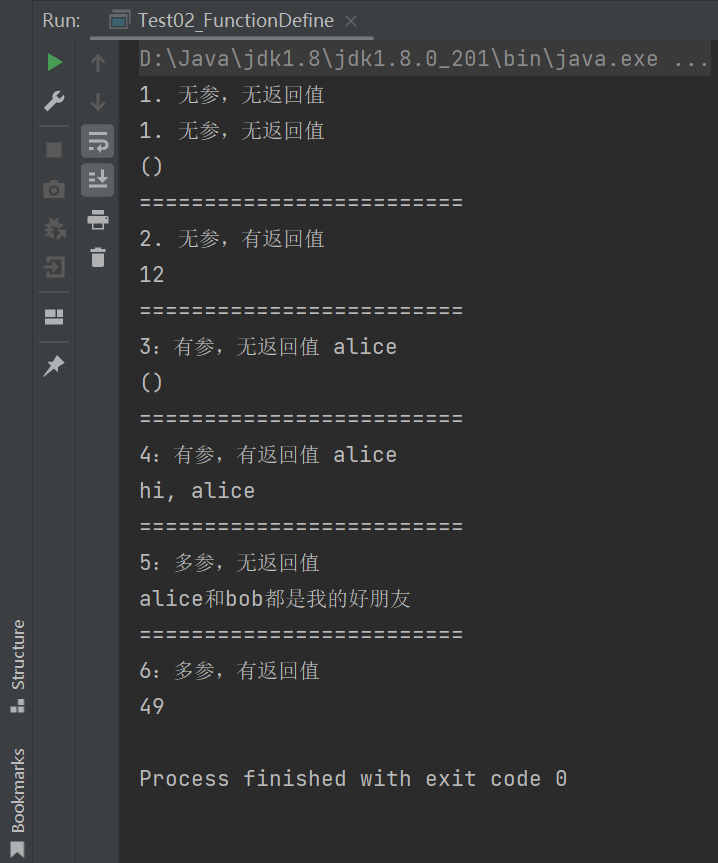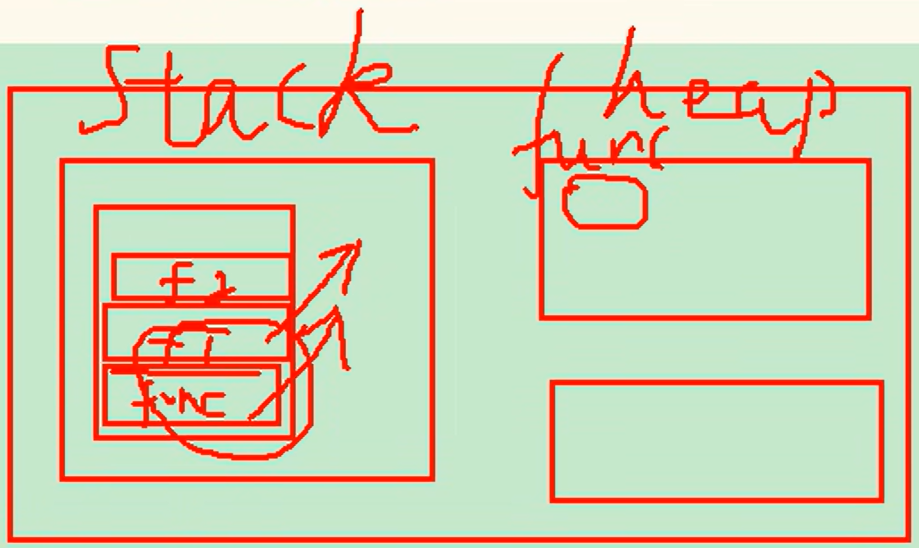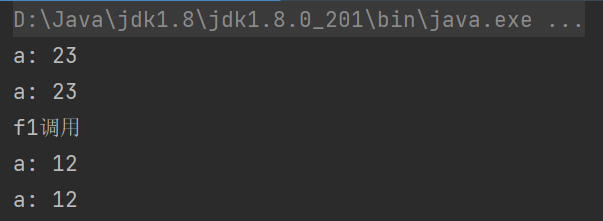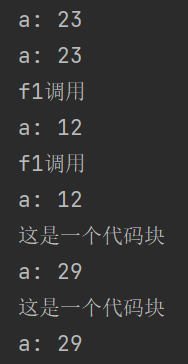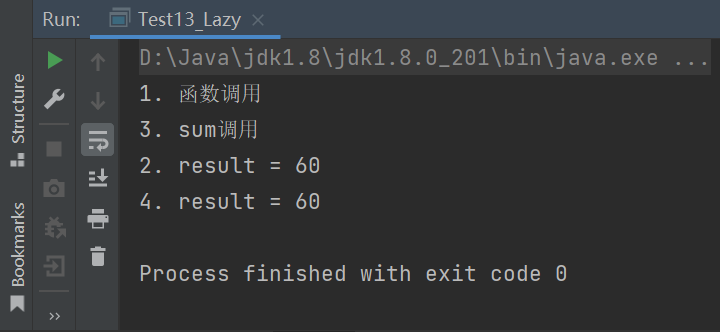视频地址:尚硅谷大数据技术之Scala入门到精通教程(小白快速上手scala)_哔哩哔哩_bilibili
- 尚硅谷大数据技术Scala教程-笔记01【Scala课程简介、Scala入门、变量和数据类型、运算符、流程控制】
- 尚硅谷大数据技术Scala教程-笔记02【函数式编程】
- 尚硅谷大数据技术Scala教程-笔记03【面向对象】
- 尚硅谷大数据技术Scala教程-笔记04【集合】
- 尚硅谷大数据技术Scala教程-笔记05【模式匹配、异常】
目录
P048【048_尚硅谷_Scala_函数式编程(一)_函数式编程思想】15:11
P049【049_尚硅谷_Scala_函数式编程(二)_函数基础(一)_函数和方法】13:12
P050【050_尚硅谷_Scala_函数式编程(二)_函数基础(二)_函数定义】10:03
P051【051_尚硅谷_Scala_函数式编程(二)_函数基础(三)_函数参数特殊用法】12:39
P052【052_尚硅谷_Scala_函数式编程(二)_函数基础(四)_函数至简原则】18:56
P053【053_尚硅谷_Scala_函数式编程(三)_函数高级(一)_匿名函数(一)_概念及简化规则】16:09
P054【054_尚硅谷_Scala_函数式编程(三)_函数高级(一)_匿名函数(二)_示例】11:21
P055【055_尚硅谷_Scala_函数式编程(三)_函数高级(二)_高阶函数(一)_函数作为值传递】11:41
P056【056_尚硅谷_Scala_函数式编程(三)_函数高级(二)_高阶函数(二)_函数作为参数传递】04:34
P057【057_尚硅谷_Scala_函数式编程(三)_函数高级(二)_高阶函数(三)_函数作为返回值】05:55
P058【058_尚硅谷_Scala_函数式编程(三)_函数高级(二)_高阶函数(四)_应用案例】12:58
P059【059_尚硅谷_Scala_函数式编程(三)_函数高级(三)_扩展练习(一)_匿名函数】04:48
P060【060_尚硅谷_Scala_函数式编程(三)_函数高级(三)_扩展练习(二)_函数作为返回值】13:50
P061【061_尚硅谷_Scala_函数式编程(三)_函数高级(四)_闭包(一)_概念和原理】10:52
P062【062_尚硅谷_Scala_函数式编程(三)_函数高级(四)_闭包(二)_具体应用】17:54
P063【063_尚硅谷_Scala_函数式编程(三)_函数高级(四)_柯里化】06:16
P064【064_尚硅谷_Scala_函数式编程(三)_函数高级(五)_递归(一)_概念和实现】10:19
P065【065_尚硅谷_Scala_函数式编程(三)_函数高级(五)_递归(二)_尾递归优化】17:50
P066【066_尚硅谷_Scala_函数式编程(三)_函数高级(六)_控制抽象(一)_传值参数】04:34
P067【067_尚硅谷_Scala_函数式编程(三)_函数高级(六)_控制抽象(二)_传名参数】08:52
P068【068_尚硅谷_Scala_函数式编程(三)_函数高级(六)_控制抽象(三)_自定义While循环】16:34
P069【069_尚硅谷_Scala_函数式编程(三)_函数高级(七)_惰性加载】06:33
第05章-Scala课程简介
P048【048_尚硅谷_Scala_函数式编程(一)_函数式编程思想】15:11
- 1)面向对象编程
- 2)函数式编程
- 3)在Scala中函数式编程和面向对象编程完美融合在一起了。
P049【049_尚硅谷_Scala_函数式编程(二)_函数基础(一)_函数和方法】13:12
package chapter05
object Test01_FunctionAndMethod {
def main(args: Array[String]): Unit = {
// 定义函数
def sayHi(name: String): Unit = {
println("hi, " + name)
}
// 调用函数
sayHi("alice")
// 调用对象方法
Test01_FunctionAndMethod.sayHi("bob")
// 获取方法返回值
val result = Test01_FunctionAndMethod.sayHello("cary")
println(result)
}
// 定义对象的方法
def sayHi(name: String): Unit = {
println("Hi, " + name)
}
def sayHello(name: String): String = {
println("Hello, " + name)
return "Hello"
}
}P050【050_尚硅谷_Scala_函数式编程(二)_函数基础(二)_函数定义】10:03
package chapter05
object Test02_FunctionDefine {
def main(args: Array[String]): Unit = {
// (1)函数1:无参,无返回值
def f1(): Unit = {
println("1. 无参,无返回值")
}
f1()
println(f1())
println("=========================")
// (2)函数2:无参,有返回值
def f2(): Int = {
println("2. 无参,有返回值")
return 12
}
println(f2())
println("=========================")
// (3)函数3:有参,无返回值
def f3(name: String): Unit = {
println("3:有参,无返回值 " + name)
}
println(f3("alice"))
println("=========================")
// (4)函数4:有参,有返回值
def f4(name: String): String = {
println("4:有参,有返回值 " + name)
return "hi, " + name
}
println(f4("alice"))
println("=========================")
// (5)函数5:多参,无返回值
def f5(name1: String, name2: String): Unit = {
println("5:多参,无返回值")
println(s"${name1}和${name2}都是我的好朋友")
}
f5("alice", "bob")
println("=========================")
// (6)函数6:多参,有返回值
def f6(a: Int, b: Int): Int = {
println("6:多参,有返回值")
return a + b
}
println(f6(12, 37))
}
}P051【051_尚硅谷_Scala_函数式编程(二)_函数基础(三)_函数参数特殊用法】12:39
package chapter05
object Test03_FunctionParameter {
def main(args: Array[String]): Unit = {
// (1)可变参数
def f1(str: String*): Unit = {
println(str)
}
f1("alice")
f1("aaa", "bbb", "ccc")
// (2)如果参数列表中存在多个参数,那么可变参数一般放置在最后
def f2(str1: String, str2: String*): Unit = {
println("str1: " + str1 + ",str2: " + str2)
}
f2("alice")
f2("aaa", "bbb", "ccc")
// (3)参数默认值,一般将有默认值的参数放置在参数列表的后面
def f3(name: String = "atguigu"): Unit = {
println("My school is " + name)
}
f3("school")
f3()
// (4)带名参数
def f4(name: String = "atguigu", age: Int): Unit = {
println(s"${age}岁的${name}在尚硅谷学习")
}
f4("alice", 20)
f4(age = 23, name = "bob")
f4(age = 21)
}
}P052【052_尚硅谷_Scala_函数式编程(二)_函数基础(四)_函数至简原则】18:56
package chapter05
// 函数至简原则
object Test04_Simplify {
def main(args: Array[String]): Unit = {
def f0(name: String): String = {
return name
}
println(f0("atguigu"))
println("==========================")
// (1)return可以省略,Scala会使用函数体的最后一行代码作为返回值
def f1(name: String): String = {
name
}
println(f1("atguigu"))
println("==========================")
// (2)如果函数体只有一行代码,可以省略花括号
def f2(name: String): String = name
println(f2("atguigu"))
println("==========================")
// (3)返回值类型如果能够推断出来,那么可以省略(:和返回值类型一起省略)
def f3(name: String) = name
println(f3("atguigu"))
println("==========================")
// (4)如果有return,则不能省略返回值类型,必须指定
// def f4(name: String) = {
// return name
// }
//
// println(f4("atguigu"))
println("==========================")
// (5)如果函数明确声明unit,那么即使函数体中使用return关键字也不起作用
def f5(name: String): Unit = {
return name
}
println(f5("atguigu"))
println("==========================")
// (6)Scala如果期望是无返回值类型,可以省略等号
def f6(name: String) {
println(name)
}
println(f6("atguigu"))
println("==========================")
// (7)如果函数无参,但是声明了参数列表,那么调用时,小括号,可加可不加
def f7(): Unit = {
println("atguigu")
}
f7()
f7
println("==========================")
// (8)如果函数没有参数列表,那么小括号可以省略,调用时小括号必须省略
def f8: Unit = {
println("atguigu")
}
// f8()
f8
println("==========================")
// (9)如果不关心名称,只关心逻辑处理,那么函数名(def)可以省略
def f9(name: String): Unit = {
println(name)
}
// 匿名函数,lambda表达式
(name: String) => {
println(name)
}
println("==========================")
}
}P053【053_尚硅谷_Scala_函数式编程(三)_函数高级(一)_匿名函数(一)_概念及简化规则】16:09
package chapter05
object Test05_Lambda {
def main(args: Array[String]): Unit = {
val fun = (name: String) => {
println(name)
}
fun("atguigu")
println("========================")
// 定义一个函数,以函数作为参数输入
def f(func: String => Unit): Unit = {
func("atguigu")
}
f(fun)
f((name: String) => {
println(name)
})
println("========================")
// 匿名函数的简化原则
// (1)参数的类型可以省略,会根据形参进行自动的推导
f((name) => {
println(name)
})
// (2)类型省略之后,发现只有一个参数,则圆括号可以省略;其他情况:没有参数和参数超过1的永远不能省略圆括号。
f(name => {
println(name)
})
// (3)匿名函数如果只有一行,则大括号也可以省略
f(name => println(name))
// (4)如果参数只出现一次,则参数省略且后面参数可以用_代替
f(println(_))
// (5) 如果可以推断出,当前传入的println是一个函数体,而不是调用语句,可以直接省略下划线
f(println)
println("=========================")
}
}P054【054_尚硅谷_Scala_函数式编程(三)_函数高级(一)_匿名函数(二)_示例】11:21
package chapter05
object Test05_Lambda {
def main(args: Array[String]): Unit = {
// 实际示例,定义一个”二元运算“函数,只操作1和2两个数,但是具体运算通过参数传入
def dualFunctionOneAndTwo(fun: (Int, Int) => Int): Int = {
fun(1, 2)
}
val add = (a: Int, b: Int) => a + b
val minus = (a: Int, b: Int) => a - b
println(dualFunctionOneAndTwo(add))
println(dualFunctionOneAndTwo(minus))
// 匿名函数简化
println(dualFunctionOneAndTwo((a: Int, b: Int) => a + b))
println(dualFunctionOneAndTwo((a: Int, b: Int) => a - b))
println(dualFunctionOneAndTwo((a, b) => a + b))
println(dualFunctionOneAndTwo(_ + _))
println(dualFunctionOneAndTwo(_ - _))
println(dualFunctionOneAndTwo((a, b) => b - a))
println(dualFunctionOneAndTwo(-_ + _))
}
}P055【055_尚硅谷_Scala_函数式编程(三)_函数高级(二)_高阶函数(一)_函数作为值传递】11:41
package chapter05
object Test06_HighOrderFunction {
def main(args: Array[String]): Unit = {
def f(n: Int): Int = {
println("f调用")
n + 1
}
def fun(): Int = {
println("fun调用")
1
}
val result: Int = f(123)
println(result)
// 1. 函数作为值进行传递
val f1: Int => Int = f
val f2 = f _
println(f1)
println(f1(12))
println(f2)
println(f2(35))
val f3: () => Int = fun
val f4 = fun _
println(f3)
println(f4)
}
}P056【056_尚硅谷_Scala_函数式编程(三)_函数高级(二)_高阶函数(二)_函数作为参数传递】04:34
package chapter05
object Test06_HighOrderFunction {
def main(args: Array[String]): Unit = {
// 2. 函数作为参数进行传递
// 定义二元计算函数
def dualEval(op: (Int, Int) => Int, a: Int, b: Int): Int = {
op(a, b)
}
def add(a: Int, b: Int): Int = {
a + b
}
println(dualEval(add, 12, 35))
println(dualEval((a, b) => a + b, 12, 35))
println(dualEval(_ + _, 12, 35))
// 3. 函数作为函数的返回值返回
def f5(): Int => Unit = {
def f6(a: Int): Unit = {
println("f6调用 " + a)
}
f6 // 将函数直接返回
}
// val f6 = f5()
// println(f6)
// println(f6(25))
println(f5()(25))
}
}P057【057_尚硅谷_Scala_函数式编程(三)_函数高级(二)_高阶函数(三)_函数作为返回值】05:55
package chapter05
object Test06_HighOrderFunction {
def main(args: Array[String]): Unit = {
// 3. 函数作为函数的返回值返回
def f5(): Int => Unit = {
def f6(a: Int): Unit = {
println("f6调用 " + a)
}
f6 // 将函数直接返回
}
// val f6 = f5()
// println(f6)
// println(f6(25))
println(f5()(25))
}
}P058【058_尚硅谷_Scala_函数式编程(三)_函数高级(二)_高阶函数(四)_应用案例】12:58
package chapter05
object Test07_Practice_CollectionOperation {
def main(args: Array[String]): Unit = {
val arr: Array[Int] = Array(12, 45, 75, 98)
// 对数组进行处理,将操作抽象出来,处理完毕之后的结果返回一个新的数组
def arrayOperation(array: Array[Int], op: Int => Int): Array[Int] = {
for (elem <- array) yield op(elem)
}
// 定义一个加一操作
def addOne(elem: Int): Int = {
elem + 1
}
// 调用函数
val newArray: Array[Int] = arrayOperation(arr, addOne)
println(newArray.mkString(","))
// 传入匿名函数,实现元素翻倍
val newArray2 = arrayOperation(arr, _ * 2)
println(newArray2.mkString(", "))
}
}P059【059_尚硅谷_Scala_函数式编程(三)_函数高级(三)_扩展练习(一)_匿名函数】04:48
package chapter05
object Test08_Practice {
def main(args: Array[String]): Unit = {
// 1. 练习1
val fun = (i: Int, s: String, c: Char) => {
if (i == 0 && s == "" && c == '0') false else true
}
println(fun(0, "", '0'))//false
println(fun(0, "", '1'))//true
println(fun(23, "", '0'))//true
println(fun(0, "hello", '0'))//true
}
}P060【060_尚硅谷_Scala_函数式编程(三)_函数高级(三)_扩展练习(二)_函数作为返回值】13:50
package chapter05
object Test08_Practice {
def main(args: Array[String]): Unit = {
// 2. 练习2
def func(i: Int): String => (Char => Boolean) = {
def f1(s: String): Char => Boolean = {
def f2(c: Char): Boolean = {
if (i == 0 && s == "" && c == '0') false else true
}
f2
}
f1
}
println(func(0)("")('0'))//false
println(func(0)("")('1'))//true
println(func(23)("")('0'))//true
println(func(0)("hello")('0'))//true
// 匿名函数简写
def func1(i: Int): String => (Char => Boolean) = {
s => c => if (i == 0 && s == "" && c == '0') false else true
}
println(func1(0)("")('0'))//false
println(func1(0)("")('1'))//true
println(func1(23)("")('0'))//true
println(func1(0)("hello")('0'))//true
// 柯里化
def func2(i: Int)(s: String)(c: Char): Boolean = {
if (i == 0 && s == "" && c == '0') false else true
}
println(func2(0)("")('0'))//false
println(func2(0)("")('1'))//true
println(func2(23)("")('0'))//true
println(func2(0)("hello")('0'))//true
}
}P061【061_尚硅谷_Scala_函数式编程(三)_函数高级(四)_闭包(一)_概念和原理】10:52
P062【062_尚硅谷_Scala_函数式编程(三)_函数高级(四)_闭包(二)_具体应用】17:54
package chapter05
object Test09_ClosureAndCurrying {
def main(args: Array[String]): Unit = {
def add(a: Int, b: Int): Int = {
a + b
}
// 1. 考虑固定一个加数的场景
def addByFour(b: Int): Int = {
4 + b
}
// 2. 扩展固定加数改变的情况
def addByFive(b: Int): Int = {
5 + b
}
// 3. 将固定加数作为另一个参数传入,但是将其作为”第一层参数“传入
def addByFour1(): Int => Int = {
val a = 4
def addB(b: Int): Int = {
a + b
}
addB
}
def addByA(a: Int): Int => Int = {
def addB(b: Int): Int = {
a + b
}
addB
}
println(addByA(35)(24))
val addByFour2 = addByA(4)
val addByFive2 = addByA(5)
println(addByFour2(13))
println(addByFive2(25))
// 4. lambda表达式简写
def addByA1(a: Int): Int => Int = {
(b: Int) => {
a + b
}
}
def addByA2(a: Int): Int => Int = {
b => a + b
}
def addByA3(a: Int): Int => Int = a + _
val addByFour3 = addByA3(4)
val addByFive3 = addByA3(5)
println(addByFour3(13))
println(addByFive3(25))
}
}P063【063_尚硅谷_Scala_函数式编程(三)_函数高级(四)_柯里化】06:16
package chapter05
object Test09_ClosureAndCurrying {
def main(args: Array[String]): Unit = {
// 5. 柯里化
def addCurrying(a: Int)(b: Int): Int = {
a + b
}
println(addCurrying(35)(24))
}
}P064【064_尚硅谷_Scala_函数式编程(三)_函数高级(五)_递归(一)_概念和实现】10:19
public class TestRecursion {
public static void main(String[] args) {
// 计算阶乘
System.out.println(factorial(5));
System.out.println(fact(5));
}
// 1. 循环实现
public static int factorial(int n) {
int result = 1;
for (int i = 1; i <= n; i++) {
result *= i;
}
return result;
}
// 2. 递归实现
public static int fact(int n) {
// 基准情形,0! = 1
if (n == 0) return 1;
return fact(n - 1) * n;
}
}P065【065_尚硅谷_Scala_函数式编程(三)_函数高级(五)_递归(二)_尾递归优化】17:50
package chapter05
import scala.annotation.tailrec
object Test10_Recursion {
def main(args: Array[String]): Unit = {
println(fact(5))
println(tailFact(5))
}
//递归实现计算阶乘
def fact(n: Int): Int = {
if (n == 0) return 1
fact(n - 1) * n
}
//尾递归实现
def tailFact(n: Int): Int = {
@tailrec
def loop(n: Int, currRes: Int): Int = {
if (n == 0) return currRes
loop(n - 1, currRes * n)
}
loop(n, 1)
}
}P066【066_尚硅谷_Scala_函数式编程(三)_函数高级(六)_控制抽象(一)_传值参数】04:34
package chapter05
object Test11_ControlAbstraction {
def main(args: Array[String]): Unit = {
// 1. 传值参数
def f0(a: Int): Unit = {
println("a: " + a)
println("a: " + a)
}
f0(23)
def f1(): Int = {
println("f1调用")
12
}
f0(f1())
}
}P067【067_尚硅谷_Scala_函数式编程(三)_函数高级(六)_控制抽象(二)_传名参数】08:52
package chapter05
object Test11_ControlAbstraction {
def main(args: Array[String]): Unit = {
// 2. 传名参数,传递的不再是具体的值,而是代码块
def f2(a: => Int): Unit = {
println("a: " + a)
println("a: " + a)
}
f2(23)
f2(f1())
f2({
println("这是一个代码块")
29
})
}
}P068【068_尚硅谷_Scala_函数式编程(三)_函数高级(六)_控制抽象(三)_自定义While循环】16:34
package chapter05
object Test12_MyWhile {
def main(args: Array[String]): Unit = {
var n = 10
// 1. 常规的while循环
while (n >= 1) {
println(n)
n -= 1
}
// 2. 用闭包实现一个函数,将代码块作为参数传入,递归调用
def myWhile(condition: => Boolean): (=> Unit) => Unit = {
// 内层函数需要递归调用,参数就是循环体
def doLoop(op: => Unit): Unit = {
if (condition) {
op
myWhile(condition)(op)
}
}
doLoop _
}
println("=================")
n = 10
myWhile(n >= 1) {
println(n)
n -= 1
}
// 3. 用匿名函数实现
def myWhile2(condition: => Boolean): (=> Unit) => Unit = {
// 内层函数需要递归调用,参数就是循环体
op => {
if (condition) {
op
myWhile2(condition)(op)
}
}
}
println("=================")
n = 10
myWhile2(n >= 1) {
println(n)
n -= 1
}
// 3. 用柯里化实现
def myWhile3(condition: => Boolean)(op: => Unit): Unit = {
if (condition) {
op
myWhile3(condition)(op)
}
}
println("=================")
n = 10
myWhile3(n >= 1) {
println(n)
n -= 1
}
}
}P069【069_尚硅谷_Scala_函数式编程(三)_函数高级(七)_惰性加载】06:33
package chapter05
object Test13_Lazy {
def main(args: Array[String]): Unit = {
lazy val result: Int = sum(13, 47)
println("1. 函数调用")
println("2. result = " + result)
println("4. result = " + result)
}
def sum(a: Int, b: Int): Int = {
println("3. sum调用")
a + b
}
}
